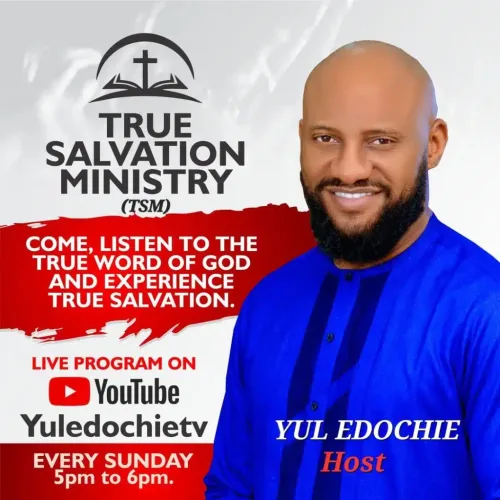Ordinarily, one would think that all pastors are real, but in Nigeria, you may be forced to think otherwise.
Determining whether a pastor is fake or real is a very delicate issue, as it revolves around personal faith and the interpretation of religious doctrines.

Therefore, it is crucial to approach this matter with a receptive mindset and reverence for diverse convictions.
The recent announcement by controversial Nollywood actor, Yul Edochie, had set the internet ablaze, as Nigerians on and offline expressed their doubts.

Yul had claimed that he was called by God, as he unveiled his church, the True Salvation Ministry.
However, Nigerians are beginning to wonder if indeed he was called to the ministry, or perhaps, the controversial figure is out to cash out.
Sheep In Wolf’s Clothing
Christianity stands as one of the most prevalent religions globally, founded upon the faith in the birth, crucifixion and resurrection of Jesus Christ.
This issue of fake pastors is not limited to Nigeria only, for selfish interests and reasons only known to the supposed shepherds, Pastors, Reverends and Spiritual leaders of many Christian gatherings, they have deceived, brainwashed and led their gullible congregation astray in the guise of leading them to Christ.
This article is not a sermon, but a guide, as it exposes ways to identify this sheep in wolf’s clothing.
How To Identify Fake Pastors, Teachers Of The Gospel
Below are some points to consider in identifying fake pastors:
Doctrinal inconsistencies:
Do the pastor’s teachings align with the core tenets of the faith they represent?
Do they deviate significantly from established scriptures or teachings?
Beware of teachings that focus on fear-mongering, superstitions, or personal aggrandisement of the pastor.
Character and conduct:
Does the pastor live a life that reflects the values they preach? This includes aspects like humility, compassion, honesty, and financial integrity.
Watch out for excessive emphasis on material wealth, extravagant lifestyles, or claims of special powers or privileges.
Leadership and relationships:
Does the pastor foster a healthy and supportive community within the church? Are they open to questions and respectful of differing viewpoints?
Be wary of leaders who exhibit controlling behaviour, manipulate or exploit members, or create division within the congregation.
Financial Practices:
Are the church’s finances transparent and used responsibly? Is there fair and open communication about funding and expenditures?
Be cautious of pastors who place excessive emphasis on tithing and donations, particularly those without clear accountability measures.
Spiritual guidance:
Does the pastor’s guidance focus on fostering genuine spiritual growth and personal connection with the divine?
Do they encourage critical thinking and independent exploration of faith?
Beware of pastors who rely heavily on emotional manipulation, promise quick fixes or guaranteed miracles, or claim exclusive access to divine knowledge.
Rubbing Minds
After all said and done, let’s rub minds a little before bringing this piece to an end.
It is crucial to bear in mind that determining someone’s spiritual authenticity is ultimately a subjective judgment.
We do not aim to discredit anyone or persons, but the purpose of these points is merely to provoke thought and promote thoughtful introspection.
Also Read: 43-Year-Old Pastor Arrested For Defiling A Minor In Ogun State
If you have any concerns regarding a pastor’s behaviour or teachings, it is essential to address them with trusted individuals within the religious community or seek guidance from established religious authorities.
Additionally, it is important to recognise that every pastor is a fallible human being.
Genuine leadership often entails acknowledging mistakes and taking steps to rectify them.
Instead of hastily labelling someone as “fake,” it is more beneficial to prioritise open communication, seeking clarification, and engaging in respectful dialogue.
Editor’s note: Please be informed that the aforementioned points are not absolute indicators and should be weighed within the context of your convictions.




